Abstract
The famous American humorist Mark Twain once wrote “don’t let school interfere with your education”. This paper builds on this theme by examining important lessons that come from work on practical problems of ground-water contamination and remediation in Canada and the United States. We draw lessons from the interesting features of the studies, and mistakes in execution, which have had important consequences. The first case study from Edmonton, Alberta Canada examines a problem of ground-water contamination due to leakage of water contaminated by 2,4-D and other contaminants from a small storage pond. This study highlights the problems related to an inadequate geologic understanding of a site, misunderstandings concerning the advantages and limitations of key tools for site investigation, and how projects can benefit from early and ongoing peer reviews. The second case study examines a problem of sewage contamination related to a deep tunnel system in Milwaukee Wisconsin. This system is designed to store surface-water overflows from an old, combined sewer system. This case study highlights the difficulties in working on unique problems without an effective conceptual hydrogeologic model, the need to always be concerned about the quality of chemical data, and the necessity of being alert to behaviors beyond typical experience. The lessons coming from these case studies have important implications for remedial work being undertaken in Korea and regulatory agencies with oversight of the projects.
Similar content being viewed by others
References
Report of the_Exfiltration Review Panel 1995, Milwaukee water pollution abatement program. Unpublished Report, Five Chapters.
Report of the_Exfiltration Review Panel 1997, Milwaukee water pollution abatement program. Unpublished Report, 37pp.
Korean Ministry of Environment, July 2002, An integrated measure for preservation and restroration of ground water, Press Release.
Jeon, S., Koo, M., Kim, Y., Kang, I., 2005, Statistical analyses of characteristics of Korean aquifer system using pumping test data of the National Groundwater Monitoring Wells (NGMWs), J. of Korean Groundwater and Soil Society, 10(6), 32–44.
Author information
Authors and Affiliations
Corresponding author
Rights and permissions
About this article
Cite this article
Schwartz, F.W., Lee, E.S. & Kim, Y. Lessons from practice in the assessment and remediation of contaminated ground water. Geosci J 12, 97–105 (2008). https://doi.org/10.1007/s12303-008-0012-y
Received:
Accepted:
Published:
Issue Date:
DOI: https://doi.org/10.1007/s12303-008-0012-y




